Fear. 1996. Directed by James Foley. Screenplay by Christopher Crowe.
Starring Reese Witherspoon, Mark Wahlberg, William Petersen, Amy Brenneman, Alyssa Milano, Tracy Fraim, Gary Riley, Jason Kristofer, Jed Rees, & Todd Caldecott.
Imagine Entertainment/Universal Pictures
Rated R. 97 minutes.
Drama/Thriller
★★★★
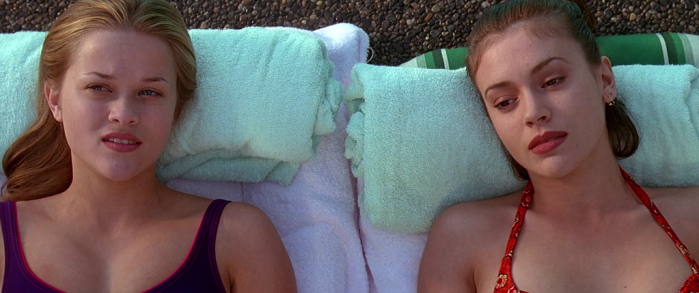 Male jealousy’s nothing new— not even in the ’90s, when Fear was released. Today, it’s even more a threat, as MRAs and other useless wastes of space are intent on rising up in the face of a new wave of feminists on the back of a (slight) societal shift in the past few years towards believing women and genuinely hearing their stories. Something that’s sorely lacking – and what Fear explores so well – is the discussion surrounding how fathers can be just as jealous as a lover when it comes to girls and women.
Male jealousy’s nothing new— not even in the ’90s, when Fear was released. Today, it’s even more a threat, as MRAs and other useless wastes of space are intent on rising up in the face of a new wave of feminists on the back of a (slight) societal shift in the past few years towards believing women and genuinely hearing their stories. Something that’s sorely lacking – and what Fear explores so well – is the discussion surrounding how fathers can be just as jealous as a lover when it comes to girls and women.
Just look at all the strange commitment ceremonies young girls are manipulated into by their families, pledging, to their fathers, not to lose their virginity until marriage. Our society’s overlooked how the protectiveness of fathers isn’t only creepy, it’s indicative of deep-seated patriarchal control, so ingrained the phenomenon seems totally natural when it’s actually anything but underneath.
James Foley’s dramatic thriller is tinged with horror, seemingly focused on outside entities threatening to destroy a family unit by corrupting the daughter. Below its surface, Fear is likewise focused on how damaging the protective nature of fathers can become when young women are treated as property. In this sense, the threatening outside entity and the father are decidedly different, yet at the core are one and the same.
 The title of the movie refers to a patriarchal fear of allowing young women to grow up, to be free and make their own decisions. Fear is actually a very conservative dramatic thriller, stressing a ‘father knows best’ attitude as justifiable because people such as David (Mark Wahlberg) – the dangerous boyfriend – are out there, waiting to prey on young daughters. There’s also a suggestion patriarchal figures – or authority figures in general – attempting to protect those daughters are inefficient, despite their strict sense of authority.
The title of the movie refers to a patriarchal fear of allowing young women to grow up, to be free and make their own decisions. Fear is actually a very conservative dramatic thriller, stressing a ‘father knows best’ attitude as justifiable because people such as David (Mark Wahlberg) – the dangerous boyfriend – are out there, waiting to prey on young daughters. There’s also a suggestion patriarchal figures – or authority figures in general – attempting to protect those daughters are inefficient, despite their strict sense of authority.
Nicole (Reese Witherspoon) lives under the thumb of her father, Steve (William Petersen), whose inability to let her live without nitpicking her every move causes strain on the relationship. Because Steve can’t reconcile the fact his daughter’s growing into a woman, he inadvertently drives her towards danger when she meets David. Steve’s wife Laura (Amy Brenneman) can’t get things right, either. She allows internalised misogyny to colour her parenting, telling her stepdaughter she looks “like a slut” because she wears too much makeup. She stresses “everybody needs rules” to her husband, though this feels like an excuse— under the guise of protection she perpetuates sexist ideals about how women dress.
These are only some of the dangers of being too overbearing. When David comes along, before exhibiting borderline personality disorder (BPD), he tells Nicole everything she wants to hear and allows her the freedom she can’t find at home. Like any master manipulator, David gives her what she desires. Even after he messes things up by being violent, he’s able to lure Nicole back. The movie’s plot works well as an allegory of what many families experience in real life, fictionalised and made sensational for cinematic purposes.
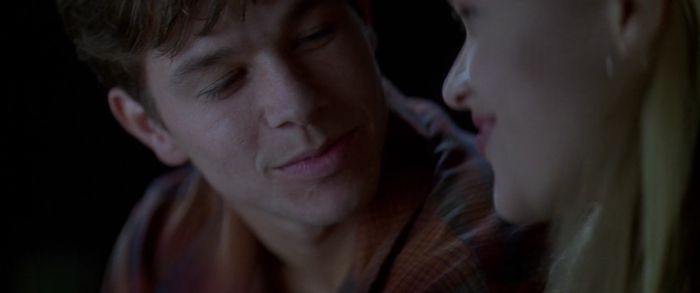
“Sometimes that’s just their asshole way of showing they love you”
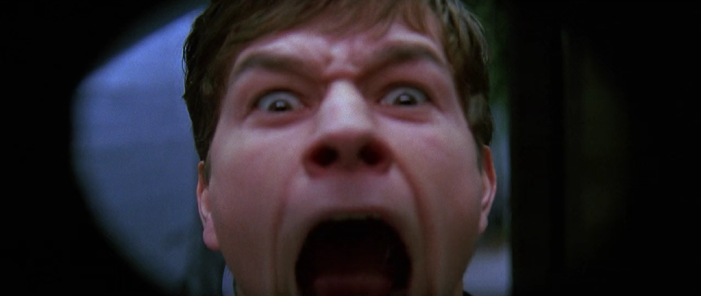 Internalised misogyny rears its head a few times throughout Fear. Both Nicole and Margo (Alyssa Milano) are young, unaware of the sexist/misogynist ideals they’ve taken into their worldviews. Margo speaks the line featured above when she and Nicole discuss David’s aggressive ways, similar to how girls are told from a young age that boys who pick on them/hit them actually have a crush and can’t externalise it. Just more dangerous ways girls and young women are indoctrinated by the patriarchy.
Internalised misogyny rears its head a few times throughout Fear. Both Nicole and Margo (Alyssa Milano) are young, unaware of the sexist/misogynist ideals they’ve taken into their worldviews. Margo speaks the line featured above when she and Nicole discuss David’s aggressive ways, similar to how girls are told from a young age that boys who pick on them/hit them actually have a crush and can’t externalise it. Just more dangerous ways girls and young women are indoctrinated by the patriarchy.
The main focus of the movie is the parallel between the control of the boyfriend and that of the father figure. Each of them has turned Nicole into an object— David sees her as an object of desire like he does all women, whereas Steve has annihilated her autonomy as an imposing dad. Typically, as in life, the struggle of the woman’s largely ignored, as the male struggle emerges as the centre of attention.
One of the earliest moments where Steve feels his authority as patriarch challenged is when David commands, not asks: “Nicole, get me a Coke.” Afterwards, the young man casually orders Nicole around as dad watches on, noticing something suddenly sinister about the formerly clean cut frat boy-looking David. There’s a queasy male jealousy here when the father’s role and purpose is usurped by the first man to take her away.
What ignites the battle fully between the two men, escalating the situation to terrifying violence, is when Steve invades the private sphere and home of David. He beats the house up and trashes it. He also finds a Daddy’s Girl bracelet he gave to his daughter etched into David’s Girl instead— a literal erasure of him as the patriarch, also an image paralleling the two men in similar terms. During a truly unnerving scene, David further marks himself to announce Nicole as his property, giving himself a homemade tattoo reading NICOLE 4 EVA. Unforgettable, in the worst kind of way.
Finally, Steve’s family home is invaded by David and his gang. This act’s precipitated by Nicole giving David the security code to the house, figuratively giving him power over her before literally giving him power by offering up her virginity. Both acts are a violation of Steve’s perceived patriarchal position, and Nicole becomes more of an object in their fight for ownership.
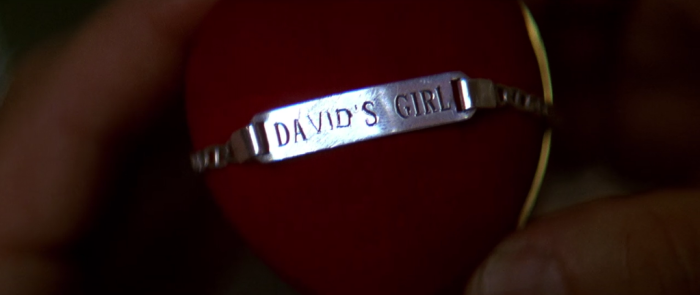
“You should’ve allowed nature to take its course. In the end it will anyway.”
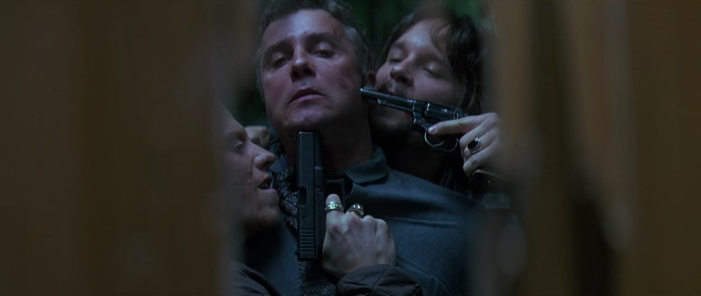 Fear touches on sensitive issues about women and girls regarding how they’re treated by the men in their lives. The movie begins with David figuratively invading the family and the father’s home, ending with a literal, brutal home invasion on the family. Ultimately, Steve saves his daughter and his family, so he’s the saviour. But the message of the story suggests his earlier actions – in his role as the patriarch/oppressor – are partly what caused the later violent climax and finale. If Steve were not so adamant on the control of his patriarchal position, if he were able to see his daughter Nicole as subject rather than object, there’s a good chance the tense fight between him and David would never have gone so far. Steve’s pride plays a large part in why he and David escalate into madness, further illustrating them as parallel views of different types of men.
Fear touches on sensitive issues about women and girls regarding how they’re treated by the men in their lives. The movie begins with David figuratively invading the family and the father’s home, ending with a literal, brutal home invasion on the family. Ultimately, Steve saves his daughter and his family, so he’s the saviour. But the message of the story suggests his earlier actions – in his role as the patriarch/oppressor – are partly what caused the later violent climax and finale. If Steve were not so adamant on the control of his patriarchal position, if he were able to see his daughter Nicole as subject rather than object, there’s a good chance the tense fight between him and David would never have gone so far. Steve’s pride plays a large part in why he and David escalate into madness, further illustrating them as parallel views of different types of men.
This is often tossed to the wayside because it’s a Marky Mark movie. Father Gore thinks Wahlberg is a tool in real life. Nevertheless, he’s incredible in this role, and certain scenes haunt me to this day. People view the story as a teen-style thriller when it’s a much more serious movie examining real social issues still faced over 20 years later.
Fear‘s themes shatter the fatherly illusion – let’s face it, the overall male illusion – of women as property. We spend so much time worrying about the male strangers out there possibly lurking in the shadows to corrupt and destroy our daughters, it’s forgotten sometimes a lot of damage done to girls/young women occurs within the home, and it doesn’t have to involve any physical abuse. The scariest part of the movie is its realness, knowing most women in our lives have dealt with these issues on one level or another. Many are still dealing, right now.


Interesting take on a film I haven’t seen in 20+ years. I’ll watch it again, when I get the chance. Back then I didn’t dwell much on it, as I was still very young. I remember liking it, though.
LikeLike